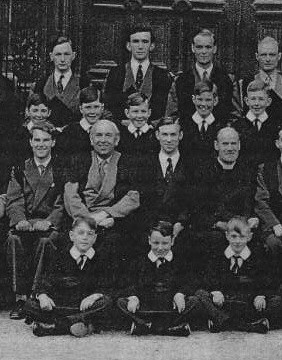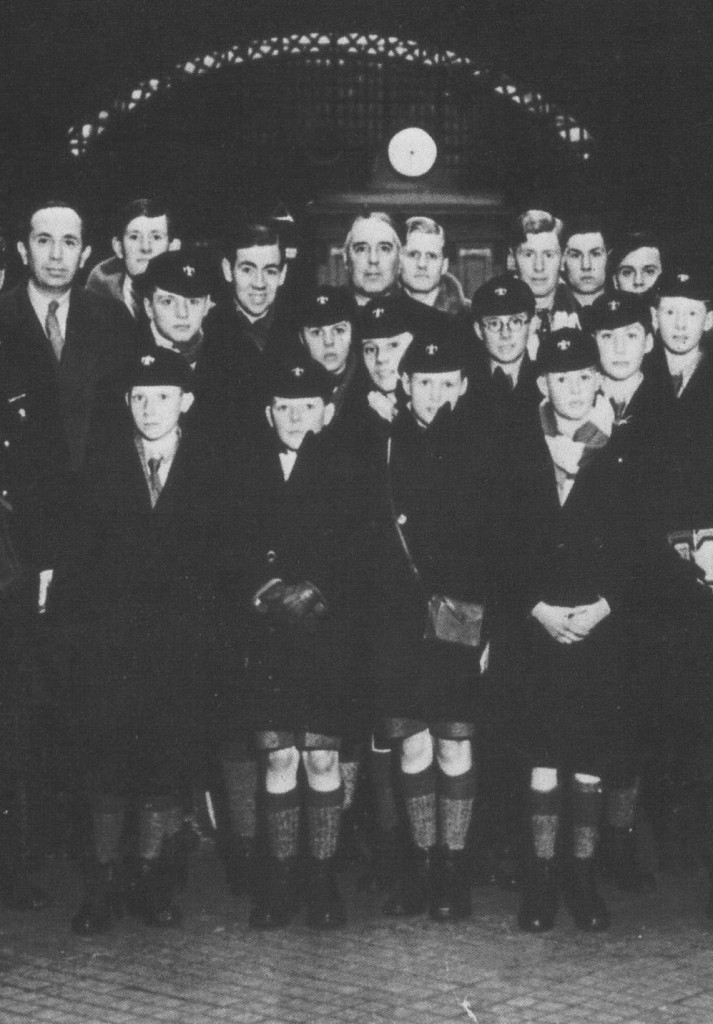Part of an official photo of the Choir of King’s College, Cambridge, taken c. 1950; Boris Ord is in the light suit with choral scholar Grayston Burgess on his right. You can just make out the top hats on the knees of the boys sitting on the ground.
When Boris Ord became director of Music at King’s College, Cambridge, in 1929, he took over a “fine choir” which had been developed by Dr A.H. Mann during his period of office, which had spanned 53 years! It’s not surprising, perhaps, that Dr Mann’s nickname was “Daddy”.
Although Mann had “a personality of great charm and kindliness [and] Boris had the highest respect for the achievements of his predecessor, he himself had a wider knowledge of music and a more comprehensive approach”. This is a quote from the slim postcard-sized commemorative booklet, written by composer Philip Radcliffe and privately printed for King’s College in 1962, the year after Ord’s death.
In addition to this prime source, I’ve recently spoken to several people who knew Ord, as organ scholars or members of his choir at King’s. In all these conversations, I have been struck by both the warmth with which he is remembered and the immediate recall that people have of events which took place from the late 1930s to the 1950s.
Michael Keall, head chorister in the 1940s, who knew Pat McGee, the head chorister during Mann’s final years, commented that when Ord took over, a big change was necessary, as Mann was steeped in the Victorian tradition. Some of the sentimental “war horses” which had outlived their usefulness were amongst the first to be swept away by Ord.
More sixteenth-century music (from editions prepared by Edmund Fellowes) was added to the repertoire, along with other changes to the daily evensong services. Ord’s reforms were helped, no doubt, by “a firm bond of sympathy in matters of musical taste” between him and the Very Reverend E.M. Milner-White, the then dean of King’s (who devised the famous Nine Lessons and Carols service).
Writing of his time as a choral scholar from 1932 to 1935, Eric Hall describes Ord as “a tyrant and friend”. He goes on to say that “The memory of Dr Mann’s long and notable service … was still sufficiently vivid to act as a spur to Boris to justify his succession and to build on the traditions of his predecessor.” But “choristers are creatures of conservative instincts”, and his changes were not always favorably received. One of the boys, in one of his weekly letters home, referred to Boris as “that loony Ord”.
Sir David Willcocks, who was Ord’s organ scholar both before and after the second world war and succeeded him as director of music in 1957, told me that he was moved to tears when he first heard the choir sing Tallis in King’s College Chapel. Even though he had been a chorister at Westminster Abbey, he had never heard a choir sing so perfectly in tune.
Ord was indeed passionate about intonation. He also “assumed that perfection was possible and drew it from the choir”, according to the countertenor Grayston Burgess, who had been brought up as a chorister at Canterbury Cathedral, with Alfred Deller, and who joined King’s as a choral scholar at the age of seventeen, in 1950. Eric Hall wrote of his experience in the 1930s, “whatever our achievement, Boris could always imagine something better [and] it is doubtful whether any performance ever quite satisfied him”.
Within a very few years of taking over, Ord had made King’s College Choir world-famous, greatly assisted, according to Willcocks, by both gramophone records and BBC radio broadcasts – most notably of the Christmas service of Nine Lessons and Carols, which began in 1928. Here’s Boris Ord conducting the first ever televised Carol Service from King’s College Chapel in 1954.
In 1936 the Foreign Office, under the auspices of the British Council, organized the first of many choir tours, to Amsterdam, Copenhagen and Stockholm. This certainly demonstrated a “wider recognition of the choir’s excellence”.
According to Sir David Lumsden,
His opera experience [he spent a year at the Cologne Opera] showed clearly in the quality of sound his singers produced. The older men in the Choir obviously transformed the overall sound compared with normal undergraduate voices, their precision of ensemble and tuning, their sensitivity to phrasing, dynamic contrast and communicating not only the words themselves but their meaning and significance.
Though there was a system of internal conducting, he must surely have been the first choirmaster to spend more time in the choir stalls than in the organ loft, which is now the norm and greatly to the benefit of standards all round.
In terms of his conducting style, “he could convey his meaning and obtain the results that he wanted with the minimum of movement”, according to Radcliffe. Everyone that I interviewed confirmed this. Grayston Burgess told me that Ord also spoke very little and could bring out a phrase simply by using his hands.



My teacher, colleague and friend John Carol Case was a choral scholar at King’s before and after the War and said that Ord’s return from active service (during which time the gentler Harold Darke had stood in for him) was ‘like a thunderbolt from Zeus’. At that time many of the pre-War choral scholars had returned to complete their studies, so much more mature as people and as singers, and JCC told me that Ord regarded this is the Golden Age of the choir. Among the returners was the organ scholar David Willcocks. (Incidentally, as I write this comes the sad news of Grayston Burgess’s death, aged 86)
I was a Corpus man, like Ord. He auditioned me twice, for a choral scholarship, and later for a solo voice part in CUMS production of V-W’s Pilgrim’s Progress at the Guildhall in 1954. I was awarded being the Guttersnipe, in the Vanity Fair. We had the Covent Garden wardrobe.
Hickox resurrected Pilgrim at St Endellion not long before his death and I was able to attend. He had not met anyone who remembered the Cambridge production and I was able to tell him of V-W attending all the rehearsals, and umpiring the spats between Ord and Dennis Arundel the Opera producer.
Boris had a party trick that terrified CUMS, that of breaking his baton in fury at his choir not WATCHING him, during the final rehearsal, of anything, and stalking out. We certainly watched after that. I still have my Verdi Requiem score with Borisms scribbled in the margins!
Ord conducted Pilgrim’s Progress with a broken arm. He had been in a car accident the day before, and must have been in great pain throughout the performance. The press said that our production was better than the ROH.